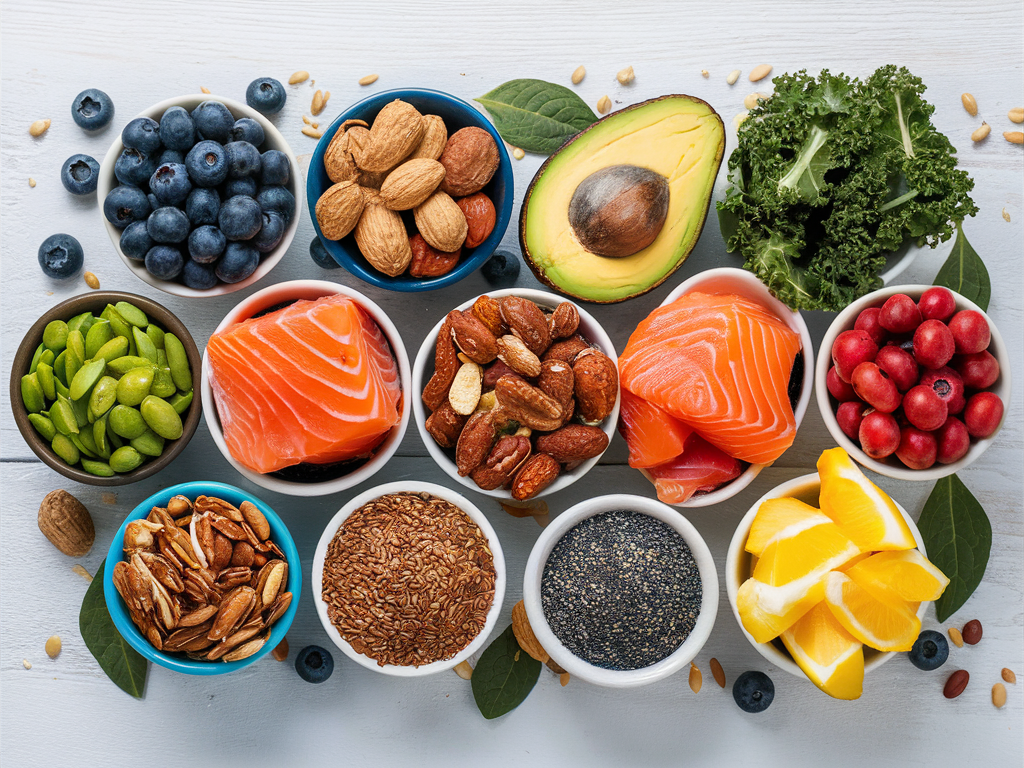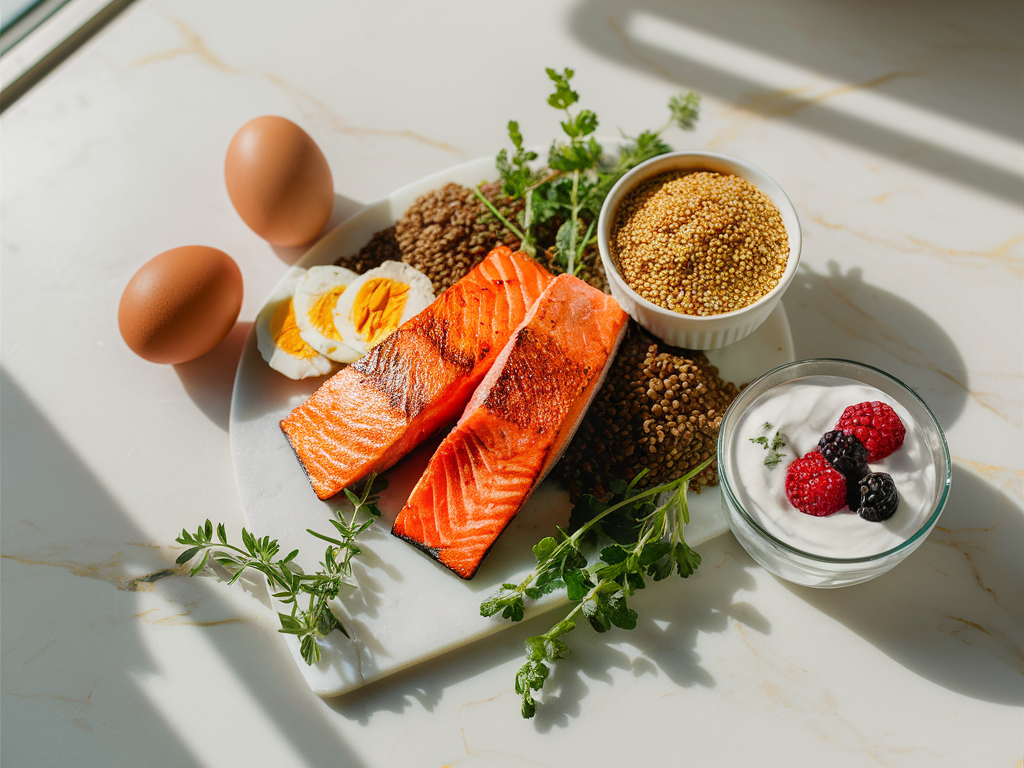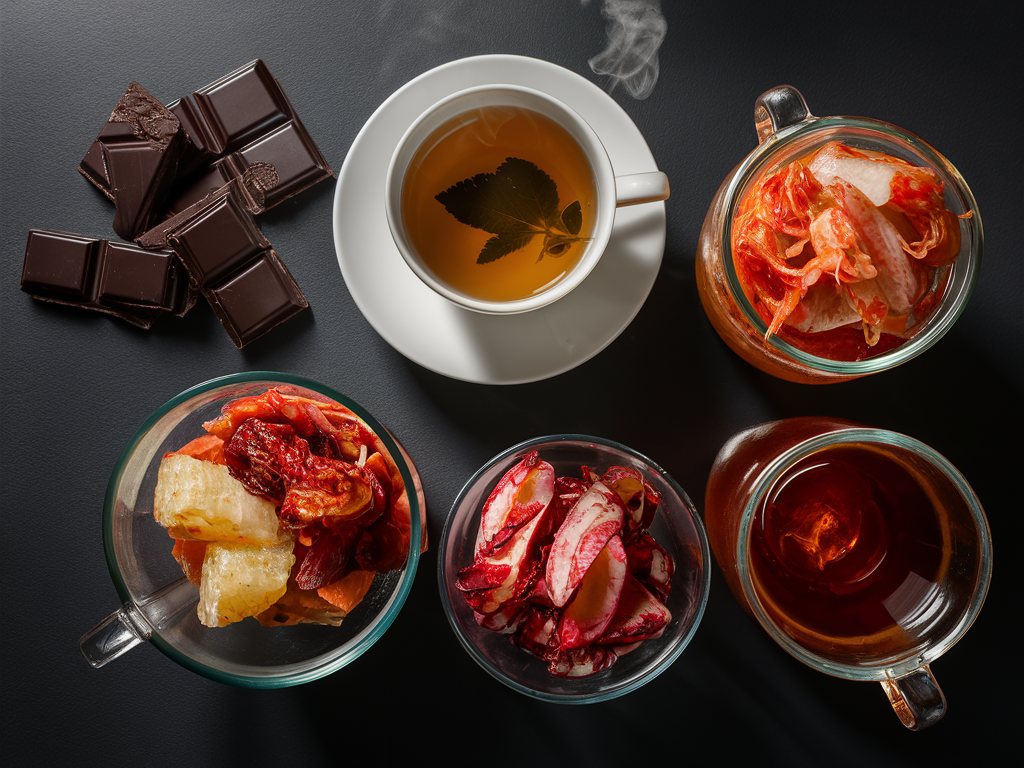In today’s fast-paced world, the quest for optimal health has never been more important. Nutrient-dense foods serve as the foundation for wellness, providing essential vitamins, minerals, antioxidants, and bioactive compounds that support everything from immune function to cognitive performance. Rather than focusing on restrictive diets, nutritionists increasingly recommend emphasizing these powerhouse foods that deliver maximum nutritional benefits per calorie.
The following comprehensive guide introduces 30 exceptional foods scientifically proven to enhance health outcomes. These nutritional champions can revolutionize your energy levels, support disease prevention, and promote longevity when incorporated consistently into your meal rotation. Best of all, these versatile ingredients can be enjoyed in countless culinary combinations, making nutritional excellence both accessible and delicious.
Whether you’re looking to overhaul your entire eating approach or simply want to make strategic upgrades to your current diet, these nutrient-rich options provide the perfect starting point for sustainable, health-promoting habits.

Antioxidant-Rich Fruits
1. Blueberries: Nature’s Antioxidant Powerhouse
Blueberries consistently rank among the highest antioxidant-containing foods on the planet. These small but mighty berries contain anthocyanins, compounds that give them their characteristic color while fighting oxidative stress and inflammation. Research associates regular blueberry consumption with improved cognitive function, particularly memory. Just one cup provides 24% of your daily vitamin C needs alongside manganese and fiber. Enjoy them fresh, frozen, in smoothies, or as a topping for yogurt and oatmeal.
2. Strawberries: Vitamin C Champions for Immune Support
Beyond their delicious flavor, strawberries deliver an impressive nutritional profile. One cup contains more vitamin C than an orange (150% of daily requirements), supporting immune function while promoting collagen production for healthy skin. Strawberries also provide manganese, folate, and potassium while remaining relatively low in natural sugars compared to many fruits. Their ellagic acid content has been studied for potential cancer-fighting properties and cardiovascular benefits.
3. Pomegranates: Ancient Superfruit with Modern Benefits
Revered for centuries across cultures, pomegranates contain unique polyphenols called punicalagins and punicic acid that exhibit potent antioxidant activity. Studies indicate these compounds may help reduce inflammation, lower blood pressure, and inhibit prostate cancer cell proliferation. The jewel-like arils make excellent additions to salads, grain bowls, and desserts, while pomegranate juice offers a convenient alternative with many of the same benefits.
4. Acai Berries: Amazonian Nutrient Treasure
This Brazilian superfruit has gained international recognition for its exceptional antioxidant capacity. Acai berries contain anthocyanins, fiber, heart-healthy fats, and plant sterols that may improve cholesterol profiles. Though usually consumed as frozen pulp or powder rather than fresh, acai maintains its nutritional integrity when properly processed. Acai bowls topped with granola, fresh fruit, and seeds provide a nutrient-dense meal or snack option packed with energy-sustaining compounds.
5. Cherries: Anti-inflammatory Properties and Sleep Benefits
Both sweet and tart cherry varieties offer impressive health benefits. Tart cherries in particular contain high levels of melatonin, potentially aiding sleep quality and duration. Athletes often consume tart cherry juice to accelerate muscle recovery and reduce exercise-induced inflammation. Cherries also provide quercetin, a flavonoid that helps combat allergic responses and respiratory inflammation. Their relatively low glycemic impact makes them suitable for those monitoring blood sugar levels.
Leafy Greens and Vegetables
6. Kale: The Nutritional Heavyweight of Greens
Kale’s reputation as a nutritional superstar is well-deserved. This cruciferous vegetable provides exceptional amounts of vitamins K, A, and C, along with manganese, copper, and B vitamins. Its sulfur-containing compounds support detoxification pathways, while its fiber content promotes digestive health. Massaging raw kale with olive oil and lemon juice helps break down its fibrous structure, making it more digestible and less bitter. Alternatively, lightly steaming kale preserves nutrients while increasing their bioavailability.
7. Spinach: Iron-rich Versatile Leafy Green
Popeye’s favorite vegetable earned its reputation through its impressive nutritional composition. Spinach provides significant amounts of non-heme iron, particularly important for plant-based eaters, alongside folate, magnesium, and vitamins A and K. The lutein and zeaxanthin in spinach support eye health by protecting against age-related macular degeneration. Its mild flavor makes it adaptable to countless dishes from smoothies and salads to soups and sautés.
8. Broccoli: Cruciferous Cancer-Fighting Vegetable
Broccoli contains sulforaphane, a sulfur-rich compound that activates detoxification enzymes and exhibits documented anti-cancer properties. This versatile vegetable provides more than 100% of daily vitamin C needs per cup, while also delivering folate, potassium, and fiber. For maximum sulforaphane content, try consuming broccoli raw or lightly steamed, as prolonged cooking can diminish some of its beneficial compounds. Broccoli sprouts offer concentrated nutrition and can be grown easily at home.
9. Sweet Potatoes: Beta-Carotene Rich Tubers
These vibrant root vegetables contain exceptional levels of beta-carotene, which converts to vitamin A in the body. Just one medium sweet potato provides over 400% of daily vitamin A requirements. Unlike white potatoes, sweet potatoes have a lower glycemic index, causing less dramatic blood sugar fluctuations. They also provide substantial amounts of vitamin C, manganese, and several B vitamins. Roasting sweet potatoes enhances their natural sweetness while preserving their nutrient content.
10. Bell Peppers: Colorful Vitamin C Sources
Bell peppers—particularly red varieties—contain more vitamin C than citrus fruits, with one red pepper providing over 300% of daily requirements. These crunchy vegetables also contain vitamin A, B6, folate, and antioxidant compounds. The different colors indicate varying phytonutrient profiles, with red peppers containing lycopene and beta-carotene, while green peppers offer lutein. Enjoy them raw for maximum vitamin retention or roasted to enhance their natural sweetness.

Protein Powerhouses
11. Wild-Caught Salmon: Omega-3 Fatty Acid Champion
Wild-caught salmon stands out for its exceptional omega-3 fatty acid content, particularly EPA and DHA which support brain health, reduce inflammation, and protect cardiovascular function. This pink-fleshed fish also provides complete protein, vitamin D, selenium, and B vitamins. The astaxanthin in salmon gives it its characteristic color while functioning as a powerful antioxidant. Aim for 2-3 servings weekly, preparing it simply by grilling, baking, or poaching to preserve its delicate flavor and nutritional integrity.
12. Eggs: Complete Protein Package
These nutritional powerhouses contain all nine essential amino acids, making them one of nature’s most complete protein sources. The yolk houses most of eggs’ nutritional benefits, including choline for brain health, lutein and zeaxanthin for eye protection, and fat-soluble vitamins. Contrary to previous concerns, research now indicates that egg consumption does not significantly impact cholesterol levels in most individuals. Pasture-raised eggs typically contain higher levels of omega-3 fatty acids and fat-soluble vitamins.
13. Lentils: Plant-Based Protein and Fiber Combination
These versatile legumes provide an impressive 18 grams of protein and 16 grams of fiber per cooked cup, making them exceptionally satiating. Lentils come in multiple varieties (red, green, brown, black) and cook more quickly than other legumes, requiring no pre-soaking. Their iron, folate, and polyphenol content supports cardiovascular health and stable energy levels. Regular lentil consumption has been associated with improved blood sugar management and reduced risk of certain cancers.
14. Greek Yogurt: Probiotic-Rich Protein Source
Traditional Greek yogurt contains nearly twice the protein of regular yogurt while providing beneficial probiotics that support gut health. This creamy dairy product supplies calcium, potassium, and B vitamins, particularly B12 which is crucial for energy production and neurological function. Opt for unsweetened varieties to avoid added sugars, then customize with fresh fruit, nuts, seeds, or a drizzle of honey. Full-fat versions provide conjugated linoleic acid (CLA), a fatty acid with potential metabolic benefits.
15. Quinoa: Complete Plant Protein Grain
Though technically a seed, quinoa functions as a grain in cooking while providing all nine essential amino acids—a rarity among plant foods. This ancient Andean crop delivers substantial amounts of magnesium, phosphorus, manganese, and folate alongside its 8 grams of protein per cooked cup. Its fiber content (5 grams per cup) supports digestive health while its complex carbohydrates provide sustained energy. Rinsing quinoa before cooking removes its natural saponin coating, which can impart bitterness.
Nuts and Seeds
16. Walnuts: Brain-Boosting Omega-3 Source
Uniquely among nuts, walnuts contain significant amounts of alpha-linolenic acid (ALA), a plant-based omega-3 fatty acid that supports cognitive function and heart health. Their polyphenol content ranks among the highest of all nuts, providing potent antioxidant protection. Walnuts also supply melatonin, potentially supporting healthy sleep patterns when consumed regularly. Just a quarter-cup serving provides 100% of daily omega-3 needs alongside protein, fiber, and minerals.
17. Chia Seeds: Tiny Nutrition Giants
Despite their small size, chia seeds deliver impressive nutritional benefits. Two tablespoons contain 10 grams of fiber, 5 grams of protein, and substantial amounts of calcium, phosphorus, and manganese. Their omega-3 content ranks among the highest of any plant food, though in the ALA form which requires conversion in the body. When exposed to liquid, chia seeds form a gel-like consistency, making them useful as egg substitutes in vegan baking or as the base for puddings.
18. Almonds: Heart-Healthy Snacking Option
Regular almond consumption associates with improved cholesterol profiles and reduced heart disease risk. These versatile nuts provide vitamin E, magnesium, and riboflavin alongside monounsaturated fats and plant protein. Their prebiotic fiber feeds beneficial gut bacteria, promoting digestive health. Though calorie-dense, research indicates that the body may not absorb all calories in almonds due to their cellular structure. Soaking and lightly roasting almonds can enhance nutrient bioavailability.
19. Flaxseeds: Lignans and Fiber for Gut Health
Flaxseeds contain the highest concentration of lignans—polyphenols with estrogen-like and antioxidant properties—of any food source. These tiny seeds provide both soluble and insoluble fiber, supporting digestive function and regularity. Their ALA omega-3 content supports heart health, while their mucilage (gelling fiber) helps stabilize blood sugar. Ground flaxseeds offer superior nutritional absorption compared to whole seeds, which may pass through the digestive tract undigested.
20. Pumpkin Seeds: Mineral-Rich Stress Fighters
Also known as pepitas, pumpkin seeds provide exceptional amounts of magnesium—nearly 40% of daily needs in a single ounce—supporting hundreds of enzymatic reactions in the body. Their zinc content supports immune function and testosterone production, while their tryptophan content may promote healthy serotonin levels and sleep quality. Pumpkin seeds also provide antioxidant protection through their vitamin E content and various plant compounds.
Healthy Fats
21. Avocados: Monounsaturated Fat Marvel
Unlike most fruits, avocados derive the majority of their calories from heart-healthy monounsaturated fats rather than carbohydrates. These creamy fruits provide more potassium than bananas while delivering substantial amounts of fiber, folate, and vitamins K, E, and B6. Avocados contain unique compounds that protect the liver and support eye health. Their oleic acid content mimics olive oil’s cardiovascular benefits, while their fiber and healthy fat combination promotes satiety.
22. Extra Virgin Olive Oil: Mediterranean Diet Staple
This cornerstone of the Mediterranean diet contains over 30 phenolic compounds with anti-inflammatory and antioxidant properties. High-quality extra virgin olive oil provides oleocanthal, a natural compound with effects similar to ibuprofen. Regular consumption associates with reduced risk of cardiovascular disease, certain cancers, and cognitive decline. For maximum benefits, use olive oil in low to medium-heat cooking or as a finishing oil to preserve its delicate phenolic compounds.
23. Coconut: Medium-Chain Triglycerides Source
Coconut products contain medium-chain triglycerides (MCTs), a unique type of fat metabolized differently than long-chain fatty acids. MCTs travel directly to the liver where they can be converted to ketones, providing a rapid energy source particularly beneficial for brain cells. Coconut also provides fiber, manganese, copper, and selenium. While its saturated fat content raised historical concerns, research increasingly distinguishes between different saturated fat structures and their health impacts.
24. Grass-Fed Butter: Vitamin K2 and CLA Benefits
Butter from grass-fed cows contains significantly higher levels of beneficial compounds than conventional butter. It provides vitamin K2 (MK-4), which directs calcium to bones rather than arteries, and conjugated linoleic acid (CLA), a fatty acid with potential anti-inflammatory and metabolism-supporting properties. Grass-fed butter also contains higher levels of omega-3 fatty acids and fat-soluble vitamins. Its butyrate content supports gut health and may have anti-inflammatory effects.
Superfoods and Functional Foods
25. Turmeric: Anti-inflammatory Spice
This vibrant golden spice contains curcumin, a powerful anti-inflammatory compound with documented therapeutic potential for conditions ranging from arthritis to metabolic syndrome. Combining turmeric with black pepper enhances curcumin absorption by up to 2000%, as piperine in pepper inhibits liver enzymes that would otherwise rapidly metabolize curcumin. Turmeric also provides manganese, iron, and vitamin B6. Incorporate it into curries, golden milk, smoothies, or roasted vegetables.
26. Garlic: Immune-Boosting Allium
Garlic’s medicinal properties stem from allicin, a sulfur compound released when garlic is crushed or chopped and allowed to rest before cooking. Regular consumption has been linked to reduced risk of common colds, improved cholesterol profiles, and lower blood pressure. For maximum benefits, crush garlic and let it sit for 10 minutes before exposure to heat, which preserves its active compounds. Aged garlic extract offers concentrated benefits for those seeking therapeutic effects.
27. Dark Chocolate: Antioxidant-Rich Treat
High-cacao dark chocolate (70%+ cacao content) provides impressive amounts of flavanols, antioxidant compounds that support cardiovascular health by enhancing nitric oxide production and improving endothelial function. These compounds also support cognitive function and mood through increased cerebral blood flow. Dark chocolate provides iron, magnesium, copper, and manganese while containing less sugar than milk chocolate varieties. Opt for minimally processed chocolate for maximum flavanol preservation.

28. Green Tea: Metabolism-Boosting Beverage
Green tea contains catechins, particularly epigallocatechin gallate (EGCG), which exhibit potent antioxidant activity and support metabolic health. The combination of caffeine and L-theanine in green tea provides balanced energy without the jitters associated with coffee. Regular consumption associates with reduced risk of several chronic diseases including certain cancers, heart disease, and neurodegenerative conditions. For maximum catechin content, brew tea in water below boiling (175°F/80°C) for no more than 2-3 minutes.
29. Bone Broth: Collagen and Mineral Support
Slowly simmered bone broth provides readily absorbable forms of collagen, gelatin, glutamine, glycine, and proline—amino acids that support joint health, gut integrity, and skin elasticity. The extended cooking process extracts minerals including calcium, magnesium, phosphorus, and potassium from the bones. Traditional bone broth serves as both culinary ingredient and therapeutic food, supporting digestive healing and reducing inflammation. Quality varies significantly based on ingredients and preparation methods.
30. Fermented Foods: Gut Microbiome Enhancers
Fermented foods like sauerkraut, kimchi, kefir, and tempeh contain beneficial bacteria that support digestive health while enhancing the immune system, which is largely housed in the gut. The fermentation process increases bioavailability of nutrients while reducing anti-nutrients present in the original ingredients. These foods provide diverse probiotic strains alongside postbiotic metabolites created during fermentation. For maximum probiotic benefits, choose unpasteurized versions with live cultures, typically found refrigerated.
Creating a Balanced Nutritional Approach
While each of these 30 foods offers impressive standalone benefits, their true power emerges when consumed as part of a varied, plant-forward dietary pattern. Rather than focusing exclusively on individual “superfoods,” create meals that combine multiple nutrient-dense ingredients. For example, a salad containing leafy greens, colorful vegetables, proteins, healthy fats, and seeds provides complementary nutrients that work synergistically.
Remember that individualized nutrition matters—your specific needs may vary based on age, activity level, health status, and genetic factors. Some people thrive with more protein, while others benefit from higher healthy fat intake. Consider consulting with a registered dietitian for personalized guidance on optimizing your nutritional approach.
Most importantly, sustainability remains key to long-term health. The most nutrient-dense diet only works when you can maintain it consistently. Focus on gradual incorporation of these foods rather than drastic overnight changes. With time, your palate will adapt to appreciate the complex flavors of whole, nutrient-rich foods, making healthier choices both satisfying and sustainable.

